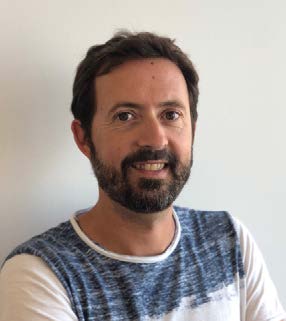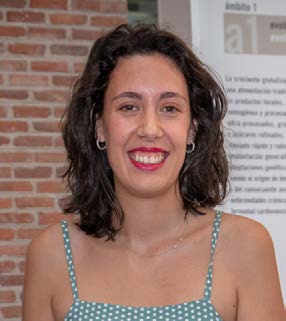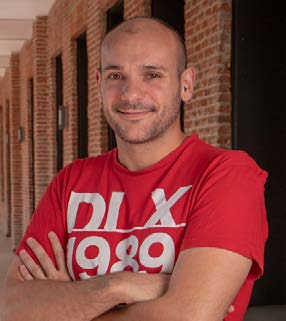Research Program. Precision Nutrition and Aging
Nutritional Interventions Group
Group leader: Dr. Rafael de Cabo
Objectives: Our group is focused on understanding basic mechanisms underlying aging processes in order to develop and translate interventions aimed to preserve function late in life, to delay the onset of age-related diseases and to improve healthy life expectancy. The Nutritional Interventions Group focuses on energy restriction-based strategies applied to model organisms to decipher variations in energy demands and cellular energetic metabolism, a fundamental hallmark of the aging process
Dr. Rafael de Cabo
Senior investigator of the Experimental Gerontology Section at NIA (NIH-USA) and Program Director of the Precision Nutrition and Aging Program at IMDEA Food.
 Rafael de Cabo, PhD is currently the chief of the Translational Gerontology Branch at the National Institute on Aging in Baltimore, Maryland. A native of Cordoba, Spain, he received his B.S. from the University of Cordoba, and his Ph.D. in 2000 from the Department of Foods and Nutrition at Purdue University. Upon completion of his graduate education, he trained as a postdoctoral fellow in the Laboratory of Neurosciences at the National Institute on Aging in Baltimore, Maryland. In 2004, he was appointed as a tenure track investigator in the Laboratory of Experimental Gerontology. His group applies both physiological and tissue-specific molecular approaches to investigate effects of nutritional interventions on basic mechanisms of aging and age-related diseases. Research within his unit strives to identify protective mechanisms invoked by caloric restriction and to evaluate the consequences of dietary interventions on lifespan, pathology, and behavioral function. Dr. de Cabo’s research balances the exploration of in vivo rodent, as well as in vitro, paradigms of caloric restriction.
Rafael de Cabo, PhD is currently the chief of the Translational Gerontology Branch at the National Institute on Aging in Baltimore, Maryland. A native of Cordoba, Spain, he received his B.S. from the University of Cordoba, and his Ph.D. in 2000 from the Department of Foods and Nutrition at Purdue University. Upon completion of his graduate education, he trained as a postdoctoral fellow in the Laboratory of Neurosciences at the National Institute on Aging in Baltimore, Maryland. In 2004, he was appointed as a tenure track investigator in the Laboratory of Experimental Gerontology. His group applies both physiological and tissue-specific molecular approaches to investigate effects of nutritional interventions on basic mechanisms of aging and age-related diseases. Research within his unit strives to identify protective mechanisms invoked by caloric restriction and to evaluate the consequences of dietary interventions on lifespan, pathology, and behavioral function. Dr. de Cabo’s research balances the exploration of in vivo rodent, as well as in vitro, paradigms of caloric restriction.
Members
Alberto Díaz-Ruiz
Senior Researcher and Head of Research Line in Aging and Longevity
 Alberto Diaz-Ruiz is a M. Sc. Veterinary Medicine specialized in the fields of metabolism, obesity, and aging. He received a tenure track position granted by the Madrid Community “Talent Program” competitive call, within the Group of Nutritional Interventions, Precision Nutrition and Aging Program, at IMDEA Food Institute (Madrid). His research focuses on the effects of fasting-mediated nutritional interventions on lifespan and healthspan in mice and humans. By now, ha has co-authored 31 articles in the highest journals of the fields (Cell Stem Cell, Aging Cell, Embo Reports or Diabetes). His academic and research education was carried out in Spain and United States. He obtained his PhD in Sciences in 2011 (University of Cordoba). During his pre-doctoral phase, he was also awarded with two research training fellowships at the Center for Basic Neuroscience (University of Dallas) and the Department of Molecular and Cellular Physiology (Stanford University School of Medicine), supervised by Dr. Thomas C. Sudhof, who was awarded with the 2013-Nobel Prize in Medicine. His PhD studies aimed to understand the molecular mechanisms influencing the control of the secretory pathway in endocrine cells. In 2012, he obtained a two-years research associated period funded by a highly competitive grant
Alberto Diaz-Ruiz is a M. Sc. Veterinary Medicine specialized in the fields of metabolism, obesity, and aging. He received a tenure track position granted by the Madrid Community “Talent Program” competitive call, within the Group of Nutritional Interventions, Precision Nutrition and Aging Program, at IMDEA Food Institute (Madrid). His research focuses on the effects of fasting-mediated nutritional interventions on lifespan and healthspan in mice and humans. By now, ha has co-authored 31 articles in the highest journals of the fields (Cell Stem Cell, Aging Cell, Embo Reports or Diabetes). His academic and research education was carried out in Spain and United States. He obtained his PhD in Sciences in 2011 (University of Cordoba). During his pre-doctoral phase, he was also awarded with two research training fellowships at the Center for Basic Neuroscience (University of Dallas) and the Department of Molecular and Cellular Physiology (Stanford University School of Medicine), supervised by Dr. Thomas C. Sudhof, who was awarded with the 2013-Nobel Prize in Medicine. His PhD studies aimed to understand the molecular mechanisms influencing the control of the secretory pathway in endocrine cells. In 2012, he obtained a two-years research associated period funded by a highly competitive grant
(Proyecto de Excelencia, Junta de Andalucía) under the supervision of Dr. Maria del Mar Malagón. During this period, he successfully applied several proteomic methods for the study of human adipose tissue as an endocrine organ which helped to unveil novel factors and pathways underlying the association between obesity and metabolic disease. In 2014, he obtained a 5-years post-doctoral research fellowship under the supervision of Dr. Rafael de Cabo at the National Institute on Aging (NIA, USA). During this period, he successfully integrated genetic, nutritional, and pharmacological interventions that directly target nutrient sensing pathways, aiming to disclose the relevance of metabolic imbalances and deregulated nutrient sensing influencing aging and worldwide metabolic diseases including obesity and nonalcoholic fatty liver disease. Currently, he is devoted to study how modulation of the daily eating patterns such us the frequency and/or the fasting time, with or without reduction of total intake, influence circulating factors for the control of metabolic pathways, lately influencing health.
Email: alberto.diazruiz@imdea.org
Phone: +34 91 727 81 00
María Castejón
Predoctoral Researcher
 María Castejón Mariscal de Gante academic and research education was carried out in Spain and The Netherlands. She obtained her bachelor’s degree in 2015 (Complutense University of Madrid) and her master’s degree in biomedical science in Rijksuniversiteit Groningen (RUG) in 2017. She acquired broad knowledge in microbiology, from a bioinformatics point of view by analyzing the similarities between different bacterial species, and then by understanding the relationship between gut microbiota and brain (gut-brain axis), especially in relation with Parkinson ’s disease. The results generated during this period have served to publish 2 articles in International Journal of Systematic and Evolutionary Microbiology and Nature Communication. In addition, she had the opportunity during the master to enrol in several courses related to the aging and nutrition field. Maria joined the group of Nutritional Interventions in January 2019, where she is currently doing her predoctoral thesis studying the effects of nutritional interventions based on energy restriction on healthspan and lifespan in mice.
María Castejón Mariscal de Gante academic and research education was carried out in Spain and The Netherlands. She obtained her bachelor’s degree in 2015 (Complutense University of Madrid) and her master’s degree in biomedical science in Rijksuniversiteit Groningen (RUG) in 2017. She acquired broad knowledge in microbiology, from a bioinformatics point of view by analyzing the similarities between different bacterial species, and then by understanding the relationship between gut microbiota and brain (gut-brain axis), especially in relation with Parkinson ’s disease. The results generated during this period have served to publish 2 articles in International Journal of Systematic and Evolutionary Microbiology and Nature Communication. In addition, she had the opportunity during the master to enrol in several courses related to the aging and nutrition field. Maria joined the group of Nutritional Interventions in January 2019, where she is currently doing her predoctoral thesis studying the effects of nutritional interventions based on energy restriction on healthspan and lifespan in mice.
Email: maria.castejon@imdea.org
Phone: +34 91 727 81 00
Jose Luis López
Lab Technician
 Jose Luis Lopez is a highly skilled technician, with more than 7 years of experience in the management of mouse colonies and a wide range of experimental techniques in mouse models. He has worked in the Comparative Medicine Unit at the Spanish National Cardiovascular Research Center - CNIC, where he gained expertise in mouse colony databases. Currently, Jose Luis is the person in charge of mouse experiments of the Metabolic Syndrome Group at IMDEA Food, coordinating the mouse colonies housed in different animal facilities (CNB, CNIO, UAM), performing the most specific experiments and setting up different animal techniques. In addition, Jose Luis also supports different research lines using several molecular biology techniques, such as cell culture, confocal microscopy or q-PCR.
Jose Luis Lopez is a highly skilled technician, with more than 7 years of experience in the management of mouse colonies and a wide range of experimental techniques in mouse models. He has worked in the Comparative Medicine Unit at the Spanish National Cardiovascular Research Center - CNIC, where he gained expertise in mouse colony databases. Currently, Jose Luis is the person in charge of mouse experiments of the Metabolic Syndrome Group at IMDEA Food, coordinating the mouse colonies housed in different animal facilities (CNB, CNIO, UAM), performing the most specific experiments and setting up different animal techniques. In addition, Jose Luis also supports different research lines using several molecular biology techniques, such as cell culture, confocal microscopy or q-PCR.
Email: joseluis.lopez@imdea.org
Phone: +34 91 727 81 00
| most relevant publications |
|
| main research grants |
|
Principal Investigator: Alberto Díaz-Ruiz ___________ |
